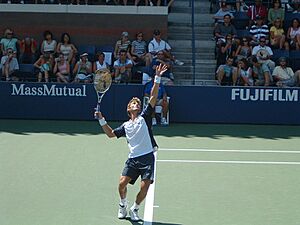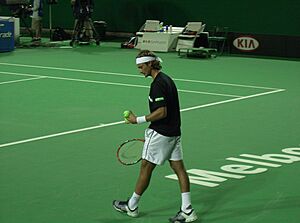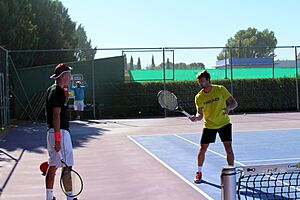Juan Carlos Ferrero facts for kids
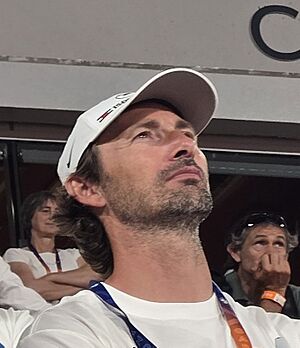
Ferrero in June 2025
|
|
| Full name | Juan Carlos Ferrero Donat |
|---|---|
| Country (sports) | |
| Born | 12 February 1980 Ontinyent, Spain |
| Height | 1.83 m (6 ft 0 in) |
| Turned pro | 1998 |
| Retired | 2012 |
| Plays | Right-handed (two-handed backhand) |
| Prize money | $13,992,895 |
| Singles | |
| Career record | 479–262 (64.64%) (64.6%) |
| Career titles | 16 |
| Highest ranking | No. 1 (8 September 2003) |
| Grand Slam singles results | |
| Australian Open | SF (2004) |
| French Open | W (2003) |
| Wimbledon | QF (2007, 2009) |
| US Open | F (2003) |
| Other tournaments | |
| Tour Finals | F (2002) |
| Olympic Games | QF (2000) |
| Doubles | |
| Career record | 6–24 (20.0%) |
| Career titles | 0 |
| Highest ranking | No. 198 (3 February 2003) |
| Grand Slam doubles results | |
| Australian Open | 1R (2004, 2005) |
| Wimbledon | 1R (2002, 2003) |
| US Open | 1R (2006) |
| Team competitions | |
| Davis Cup | W (2000, 2004, 2009) |
| Coaching career (2017–) | |
| Coaching achievements | |
| Coachee singles titles total | 13 |
| List of notable tournaments (with champion)
|
|
Juan Carlos Ferrero Donat (born February 12, 1980) is a Spanish former professional tennis player who is now a famous coach. As a player, he was ranked world No. 1 and won the 2003 French Open. He was known for his speed and slim build, which earned him the nickname "el Mosquito."
Ferrero won 16 singles titles during his career. He also reached the finals of the 2002 French Open and the 2003 US Open. After retiring as a player in 2012, he became a successful coach. He is currently the coach of tennis superstar Carlos Alcaraz.
Personal life
Juan Carlos Ferrero, also known as "Juanki" or "JC," started playing tennis when he was seven years old. His father, Eduardo, often traveled with him to tournaments. He has two sisters, Ana and Laura. Ferrero has said that his mother, Rosario, who passed away when he was sixteen, was his biggest inspiration.
In 2015, he married Eva Alonso. They have three children together. Besides tennis, Ferrero owns a small luxury hotel called "Hotel Ferrero" near Valencia. He also used to be a part-owner of the Valencia Open tennis tournament with fellow player David Ferrer.
Playing Career
1999–2001: Rise to the Top 10
Ferrero turned professional in 1998 and quickly moved up the rankings. In 1999, he won his first ATP Tour title at the Majorca Open. This victory helped him break into the top 50 in the world rankings. He was named the ATP Newcomer of the Year.
By 2000, Ferrero was a top-20 player. He reached the semifinals of the French Open and helped Spain win its first-ever Davis Cup title. He defeated top Australian players Patrick Rafter and Lleyton Hewitt in the final.
In 2001, Ferrero broke into the top 10. He won four titles, including his first Masters tournament at the Rome Masters, where he beat world No. 1 Gustavo Kuerten. He finished the year ranked as the world No. 5 player.
2002–2003: French Open Champion and World No. 1
In 2002, Ferrero reached his first Grand Slam final at the French Open. He lost to fellow Spaniard Albert Costa. Later that year, he made it to the final of the Tennis Masters Cup, losing to Lleyton Hewitt. He ended the year ranked No. 4.
The year 2003 was the best of Ferrero's career. He won his first and only Grand Slam title at the French Open, defeating Martin Verkerk in the final. He didn't lose a single set in the last three rounds of the tournament.
Later that year, he reached the final of the US Open. Although he lost to Andy Roddick, his performance was enough to make him the world No. 1 player on September 8, 2003. He also won the Madrid Masters title and finished the year ranked No. 3.
2004–2008: Struggles with Injuries
After his amazing 2003 season, Ferrero began to struggle with injuries. In 2004, he had to miss several tournaments because of chicken pox and injuries to his ribs and wrist. His ranking dropped, and he finished the year at No. 31.
Over the next few years, Ferrero worked hard to get back to the top. He had some good results, like reaching the final of the Cincinnati Masters, where he beat Rafael Nadal for the first time. In 2007, he reached the quarterfinals of Wimbledon for the first time, meaning he had made it to the quarterfinals of all four Grand Slam tournaments in his career.
However, injuries continued to bother him. By the end of 2008, his ranking had fallen to No. 55, his lowest in ten years.
2009–2012: Comeback and Retirement
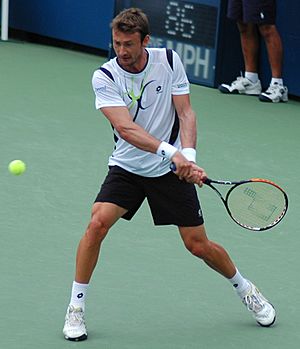
In 2009, Ferrero made an incredible comeback. After his ranking dropped out of the top 100, he won a title in Casablanca. He then had a great grass-court season, reaching the quarterfinals of Wimbledon. These results helped him climb back into the top 25.
In 2010, he won three more titles, including two in a row in Brazil and Argentina. He continued to play for two more years, winning his final career title in Stuttgart, Germany, in 2011.
In October 2012, Ferrero announced his retirement from professional tennis at the Valencia Open. He said that injuries had made it too difficult to compete at the highest level.
Coaching Career
After retiring, Ferrero became a coach. He briefly worked with Alexander Zverev in 2017.
In 2019, he started coaching a talented young Spanish player named Carlos Alcaraz. Under Ferrero's guidance, Alcaraz has become one of the best players in the world. Together, they have won five Grand Slam titles: the 2022 US Open, Wimbledon in 2023 and 2024, and the French Open in 2024 and 2025.
Alcaraz also became the youngest world No. 1 in history with Ferrero as his coach. They train at the Ferrero Tennis Academy in Villena, Spain, the same place where Ferrero trained as a young player.
Playing Style
Ferrero was known as an all-court player, meaning he could play well on all surfaces. His biggest weapon was his powerful forehand. He was also famous for his incredible speed and agility on the court, which is why he was called "the Mosquito."
While he was best known for his success on clay courts, where he won the French Open, he also had strong results on hard courts and grass courts throughout his career.
Career statistics
Grand Slam tournament finals: 3 (1 title, 2 runners-up)
| Result | Year | Championship | Surface | Opponent | Score | |
|---|---|---|---|---|---|---|
| Loss | 2002 | French Open | Clay | 1–6, 0–6, 6–4, 3–6 | ||
| Win | 2003 | French Open | Clay | 6–1, 6–3, 6–2 | ||
| Loss | 2003 | US Open | Hard | 3–6, 6–7(2–7), 3–6 |
See also
 In Spanish: Juan Carlos Ferrero para niños
In Spanish: Juan Carlos Ferrero para niños
- List of ATP number 1 ranked singles players
- List of Grand Slam men's singles champions
Images for kids


